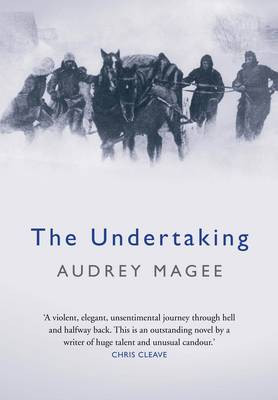
The Undertaking opens with a wedding, but it’s not a typical exchange of romantic vows. A German soldier named Peter Faber commits to Katharina Spinell from the battlefield. Her photo is tied to a nearby post of a barbed wire fence. A thousand miles away in Berlin, at exactly the same moment, Katharina commits to Peter in a similar ceremony. They’ve never met. Both are taking part in a war pact that ensures honeymoon leave for Peter and a widow’s pension for Katharina in the event of Peter’s death.
It’s a unique premise for a World War II novel that Audrey Magee, in an interview with her editor, says she discovered in conversation with a German restaurant owner. He spoke of his WWII experiences as a transport pilot and happened to mention that he married a woman he’d never met so he could get honeymoon leave. The concept fascinated this talented first-time author and helped shape the structure of a novel that had been brewing for a long time.
Regarding that brewing, Magee describes an earlier incident involving a visit to Dachau with a Jewish-American man. The concentration camp was closed, so they walked the perimeter and met a German woman tending her garden who’d lived all her life next to the camp. In a heated discussion, Magee heard from the woman an everyday existence lived with a blind eye turned to what was happening during the war, even next door. This, too, helped shaped The Undertaking.
Magee writes this unforgettable novel in spare prose that’s void of elaborate description and inner thoughts of the characters. The dialogue is written with a staccato rhythm. But don’t for a moment think the result is a dry story. It’s instead quite profound and vivid in its stark portrayal of ordinary Germans waiting for the war to be over, with Germany as the ruling empire, Berlin at the center of the world. Not much description or explanation is needed – their delusion speaks for itself, as does their selfishness and casual cruelty.

Surprisingly, during their honeymoon in Berlin, Katharina and Peter like each other and even fall in love. After their short time together, Peter returns to the Eastern Front where he faces the monumental Battle of Stalingrad. Meanwhile, Katharina enters the upper echelons of Nazi social society.
Shortly after Peter leaves, Katharina and her parents get to move into a luxury home due to their connection to the Führer’s inner circle. The apartment is filled with the previous owner’s lavish belongings. Katharina’s mother chillingly says, “It’s our turn now … our turn at the good life.” Katharina’s father trashes the library books and also a white marble bust of the composer Mendelssohn, which is later replaced with Wagner. In this instance, as in many others, the novel’s power is drawn from what’s implied and what we already know from history.
The narrative superbly goes back and forth between Katharina and Peter’s worlds, the one filled with cakes and holiday parties, the other with battles, horrific starvation and bitter cold. Their belief in a normal life with each other at the end of the war sustains their hope, but the bombing of Berlin and the defeat at Stalingrad change everything.
Katharina and Peter’s WWII story grips us with unsettling power from beginning to end in this magnificent new book. It is scheduled for publication end of the summer. Eager readers, however, can purchase the U.K. edition (the real first edition) from The Mysterious Bookshop — their books are signed firsts, a treasure for collectors, and because of that and the U.K. origin, you’ll pay a bit more.

Just found your blog via a link on Acorn Bookshop’s website. Have always enjoyed hearing you on WOSU and glad to find this!
LikeLike
Welcome, and thanks for being a WOSU listener!
Acorn Bookshop is wonderful, isn’t it? I’ve found many treasures there.
LikeLike
Once your body gets used to doing the same thing, it becomes
complacent.
LikeLike